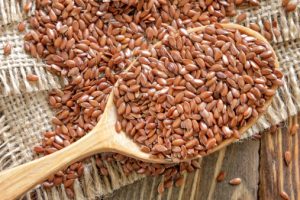
The fruit pod which is grown contains either golden-yellow seeds or brown seeds. Regardless of their color, flaxseeds aren’t called superfoods for just any reason – they pack a nutritional punch to boost health.
Flaxseed nutrition
| Flaxseeds Nutrition Facts | Nutrient Value for per 100 g |
|---|---|
| Nutrients | |
| Energy | 534 Kcal |
| Carbohydrates | 28.8 g |
| Protein | 18.3 g |
| Total Fat | 42.16 g |
| Cholesterol | 0 mg |
| Dietary Fiber | 27.3 g |
| Vitamins | |
| Folates | 87 µg |
| Niacin | 3.08 mg |
| Thiamin | 1.64 mg |
| Vitamin E | 19.95 mg |
| Vitamin K | 4.3 µg |
| Electrolytes | |
| Sodium | 30 mg |
| Potassium | 813 mg |
| Minerals | |
| Calcium | 255 mg |
| Iron | 5.73 mg |
| Magnesium | 392 mg |
| Manganese | 2.48 mg |
| Zinc | 4.34 mg |
Let’s examine one ounce (three tablespoons) of flaxseeds for its nutritional contents.
Omega-3 (ALA) 6,338mg
Fiber 8g
Protein 6g
Vitamin B1 31% Recommended Daily Allowance (RDA)
Manganese 35% RDA
Magnesium 30% RDA
Phosphorus 19% RDA
Selenium 10% RDA
Flaxseeds also contain good amounts of vitamin B6, iron, potassium, copper and zinc. As you can see, in such a small serving you already get many of your daily nutritional requirements.
7 Amazing Health benefits of flaxseeds
With its fantastic nutritional content it should be of no surprise that flaxseeds can add benefits to your health. Here are a few ways you can boost your health with the benefits of flaxseeds.
Weight loss: Research has shown that flaxseeds can benefit weight loss. Flaxseeds contain healthy fats as well as fiber. Not only will you feel satisfied longer, but you will consume fewer calories throughout the day. Furthermore, fiber keeps you regular, promoting normal bowel movements and reducing constipation which can contribute to weight gain.
Cholesterol: Not only does fiber keep us full and regular, but it can also benefit our cholesterol. Found in the journal Nutrition and Metabolism, enjoying flax seeds can benefit your cholesterol by naturally lowering it.
Gluten-free: Gluten is a common allergy, especially for people who have celiac disease. Flaxseed does not contain gluten, making it safe to eat for the majority.
Antioxidants: Antioxidants fight off free radical damage which can impair vision, lead to wrinkles and mess with hormones. Flaxseeds contain high levels of antioxidants which work to benefit your skin, hair, eyes and cells.
Digestion: Fiber and alpha-Linolenic acid (ALA) work together to improve digestion. Not only do they help you stay regular, but ALA, in particular, works to protect the lining of the gastrointestinal tract.
Heart health: Nutrients in flaxseeds can help maintain healthy blood pressure and may prevent hardening of arteries.
Diabetes: Nutrients in flaxseeds can help regulate blood sugar levels.
How to enjoy flaxseeds
If you’re ready to receive the health benefits associated with flaxseeds, here is how you can enjoy them.
Ground up and toasted flaxseeds can easily be added to just about anything. Here is a list of foods you can add flaxseeds to:
- Smoothies, shakes
- Yogurt
- Cereal
- Dessert
- Salad
- Ice cream
- Baked goods
Just add a sprinkle, a teaspoon or even a few tablespoons for added sweetness and health benefits to any meal.
Side effects and caution of flaxseeds
Generally speaking, flaxseeds are safe for anyone to consume. It is important to note that flaxseed fiber content may increase trips to the bathroom. Fiber can also lead to bloating, gas, and abdominal pain; to combat this ensure you are drinking plenty of water.
Concerns arise in those who take medication to lower blood sugar or blood pressure. Because flaxseeds have the ability to lower these numbers further, people in this category should not over consume flaxseeds or speak with their doctor first.
Flaxseeds are enjoyable and can add many benefits to your health. If you haven’t tried them yet, start incorporating them slowly into your diet to begin feeling better.